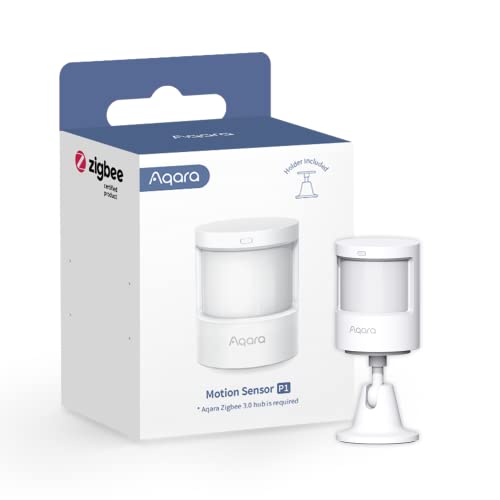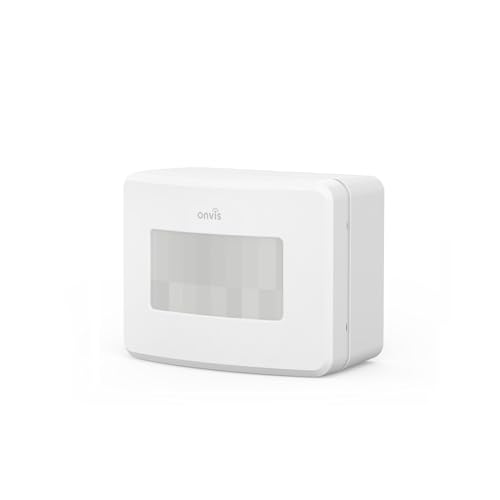10 Best Homekit Sensors: Reviewed By SHR
Mike William Feb 13, 2026 8:39 AM
When it comes to building a smart home, one of the most important decisions you'll make is which sensors to use. Sensors are devices that detect and respond to changes in the environment, and they are the backbone of any smart home system. Apple's HomeKit platform offers a variety of sensors, from door and window sensors to motion detectors and temperature sensors. But with so many options available, how do you choose the right sensors for your home? In this blog post, we'll explore some factors to consider when selecting HomeKit sensors.
Top Picks
Source: Amazon
With the category context established, the following overview narrows the focus to the best HomeKit sensors that rise above the rest in real-world use. These selections reflect a balance of reliable performance, overall value, and everyday practicality, helping readers compare standout options before diving into the detailed best picks.
Best Privacy-First. Eve Motion (Matter) 3-Pack – Smart Motion and Light Sensor
Pros
-
Matter and Thread support
-
Local-only operation
-
Indoor and outdoor use
-
Wide motion coverage
Cons
-
Hub dependency
Designed for users who prioritize reliability and data control, the Eve Motion delivers consistent motion detection with a wide field of view and dependable performance in both indoor and covered outdoor settings. Battery operation and flexible wall mounting simplify installation, while Thread networking improves responsiveness within compatible smart home setups. Automation options tied to motion and ambient brightness add practical value for everyday use, especially in lighting control scenarios. Overall, it fits best in ecosystems where Matter compatibility and local processing are fully supported.
User feedback commonly highlights the sensor’s strong privacy stance, stable connectivity, and seamless integration across supported platforms. Many users also appreciate its solid build quality and dependable detection range. However, some note that the requirement for a compatible hub adds complexity and cost, particularly for those new to smart home systems or operating across multiple platforms.
Best Zone Control. Aqara Presence Sensor FP2, mmWave Radar Wired Smart Motion Sensor
Pros
-
Multi-zone presence tracking
-
mmWave radar precision
-
Multi-person detection
-
Camera-free privacy
Cons
-
Continuous power required
The Aqara Presence Sensor FP2 stands out for its advanced mmWave radar technology, delivering precise presence detection that goes beyond basic motion sensing. Its ability to define multiple zones within a single room allows for highly granular automations, making it especially effective for complex smart home routines. Performance is strongest when properly positioned and continuously powered, with reliable detection even in low-movement scenarios such as sitting or sleeping. The added IPX5 rating further extends its usefulness into humid spaces like bathrooms.
User feedback frequently praises the sensor’s accuracy, flexible zone customization, and effectiveness in detecting subtle presence without relying on cameras. Many users also value the enhanced privacy and the option to filter out pets or environmental movement. Commonly noted limitations include the need for constant power and careful placement to maintain stable connectivity, which can reduce flexibility compared to battery-powered alternatives.
Best Battery Life. Aqara Zigbee Motion Sensor P1 3 Pack, Smart Motion
Pros
-
Five-year battery lifespan
-
Adjustable detection timeout
-
Wide viewing angle
-
Flexible mounting design
Cons
-
Aqara-only hub requirement
The Aqara Motion Sensor P1 focuses on efficiency and flexibility, offering reliable motion detection with unusually long battery life for a Zigbee-based sensor. Adjustable sensitivity, viewing angle, and detection timeout allow it to adapt well to different room layouts while minimizing false triggers. Performance is consistent within the recommended hub range, making it suitable for everyday automations such as lighting and security alerts. Its compact design and wall-mount versatility further support straightforward installation.
User feedback frequently highlights the extended battery life, responsive detection, and fine-grained configuration options available in the Aqara app. Many users appreciate the ability to customize timeouts and angles without physical modifications. Common limitations mentioned include the requirement for an Aqara-specific hub and reduced feature parity when used outside the Aqara ecosystem, particularly in HomeKit and Alexa environments.
Best Motion Dimmer. Leviton Decora Smart Motion Sensing Dimmer Switch
Pros
-
Integrated motion sensing
-
Full-range dimming control
-
Customizable lighting presets
-
HomeKit scene support
Cons
-
Wired installation required
The Leviton motion-sensing dimmer switch combines automatic lighting control with adjustable dimming, making it well suited for high-traffic areas where hands-free operation adds convenience. Motion detection reliably turns lights on when a room is occupied and off when no longer needed, while the built-in light sensor helps avoid unnecessary activation during daylight hours. Dimming, fade rates, and preset brightness levels allow lighting to feel intentional rather than abrupt. Integration with Apple Home and other Leviton smart devices expands its usefulness beyond a single switch.
User feedback often praises the convenience of touch-free operation, smooth dimming performance, and energy-saving behavior in spaces like bathrooms, closets, and kitchens. Many users also appreciate the nighttime lighting settings that provide softer illumination after dark. Common drawbacks mentioned include the need for proper wiring and installation, which may be less appealing for renters or those seeking a fully plug-and-play solution.
Best Outdoor Lighting. Philips Hue Outdoor Motion Sensor - Automatic Dusk
Pros
-
Wide outdoor coverage
-
Weather-resistant housing
-
Hue ecosystem integration
-
Flexible mounting options
Cons
-
Hue Bridge required
The Philips Hue Outdoor Motion Sensor is built for dependable exterior use, offering broad motion coverage that works well for driveways, patios, and entry points. Detection is responsive and consistent, triggering compatible Hue lights quickly without relying on Wi-Fi-heavy communication. Battery power simplifies placement, while the IP44-rated design ensures reliable operation in changing weather conditions. Its real value comes from seamless integration with the Hue lighting system and Matter-supported smart home setups.
User feedback commonly praises the sensor’s reliability outdoors, easy installation, and tight integration with Hue lights and automations. Many users appreciate the consistent detection range and stable performance in rain or cold conditions. Frequently mentioned limitations include the requirement for a Hue Bridge and higher overall cost compared to standalone outdoor motion sensors.
- 9.4
- BrandLeviton
- 9.2
- BrandPhilips Hue
- 9.0
- Brandmeross
- 8.9
- BrandAqara
- 8.7
- BrandONVIS
- 8.5
- BrandAqara
- 8.4
- BrandONVIS
Last update on 2026-02-13 / Affiliate links / Images, Product Titles, and Product Highlights from Amazon Product Advertising API
-
Door and window sensors - These sensors can detect when a door or window is opened or closed. They are great for security purposes and can alert you if someone tries to break in.
-
Motion sensors - These sensors can detect motion in a room or area. They are useful for turning on lights when you enter a room, and they can also be used for security purposes.
-
Temperature sensors - These sensors can detect the temperature in a room or area. They are useful for controlling your HVAC system, and they can also alert you if the temperature in a certain area falls outside of a set range.
-
Humidity sensors - These sensors can detect the humidity in a room or area. They are useful for controlling your HVAC system, and they can also alert you if the humidity in a certain area falls outside of a set range.
-
Air quality sensors - These sensors can detect the air quality in a room or area. They are useful for controlling your HVAC system, and they can also alert you if the air quality in a certain area falls outside of a set range.
-
Water leak sensors - These sensors can detect water leaks in your home. They are useful for preventing water damage and can alert you if there is a leak in your home.
-
Smoke and carbon monoxide detectors - These sensors can detect smoke and carbon monoxide in your home. They are essential for keeping you and your family safe and can alert you if there is a fire or carbon monoxide leak in your home.
-
Occupancy sensors - These sensors can detect if a room or area is occupied. They are useful for turning on lights when someone enters a room, and they can also be used for security purposes.
- Compatibility with HomeKit
The first and most important factor to consider when choosing HomeKit sensors is compatibility. Not all sensors are compatible with HomeKit, so it's essential to make sure the sensors you choose work with the platform. HomeKit-compatible sensors can be easily integrated into your smart home system, and you'll be able to control them using the Home app on your iPhone, iPad, or Mac.
- Type of Sensor
The next factor to consider is the type of sensor you need. HomeKit offers a wide range of sensors, including door and window sensors, motion detectors, temperature sensors, and more. Think about what you want to achieve with your smart home system and what types of sensors will help you achieve those goals.
For example, if you want to monitor the temperature in different parts of your home, a temperature sensor is a must-have. On the other hand, if you want to detect when someone enters or leaves your home, a door and window sensor would be more appropriate.
- Range and Connectivity
Another important factor to consider is the range and connectivity of the sensors. Some sensors have a limited range and require a hub or bridge to connect to your smart home system. Others can connect directly to your Wi-Fi network, which makes them more convenient and easier to set up.
It's also essential to consider the range of the sensors. If you have a large home or want to monitor an outdoor area, you'll need sensors with a longer range. In general, Bluetooth sensors have a shorter range than Wi-Fi sensors, so keep that in mind when making your selection.
- Battery Life
Most HomeKit sensors run on batteries, so it's important to consider the battery life of each sensor. Some sensors have longer battery life than others, which means you'll have to replace the batteries less frequently. Look for sensors with a battery life of at least a year, so you don't have to worry about replacing the batteries too often.
- Brand and Price
Finally, consider the brand and price of the sensors. HomeKit sensors are available from a variety of manufacturers, and prices can vary widely. In general, you get what you pay for, so don't be afraid to spend a little more on sensors from a reputable brand. Cheaper sensors may not be as reliable, and you may end up spending more in the long run replacing them.
Read More:
10 The Best Homekit Thermostat We've Tested by Smart Home Review
10 The Best Boiler Thermostat Reviews & Buyers Guide for 2026 | SHR
10 Best Connected Thermostat Reviews | Buyer's Guide 2026 by SHR
10 Best Homekit Products in 2025 Review & Buyers Guide
10 The Best Ac Controller Buyers Guide for 2026 | SHR
In conclusion, choosing the right HomeKit sensors for your smart home is essential to ensure your system is reliable and efficient. Consider compatibility, the type of sensor you need, range and connectivity, battery life, and brand and price when making your selection. With the right sensors in place, you'll be able to monitor and control your home like never before.




























